

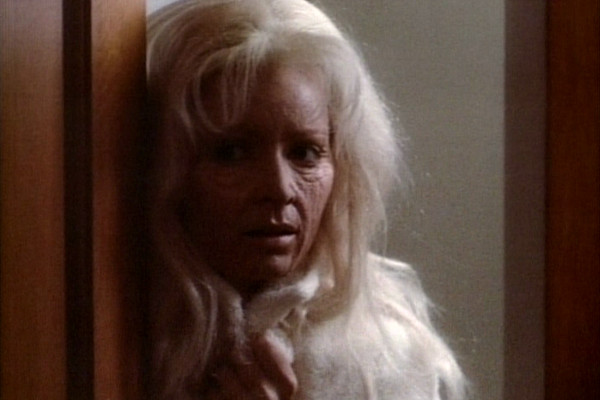
A story about a fountain of youth that's making waves in the diet industry is so prescient with the way society views women that it's still topical today. When a newsreader reaches forty, she becomes addicted to a new specialised water that can reduce aging... though with predictable side-effects. A nice enough episode, though laboured with some shallow characterisation, so-so performances and some questionable make-up. Similar themes had been previously explored, with far more acerbic results, in the 1963 episode A Short Drink from a Certain Fountain.
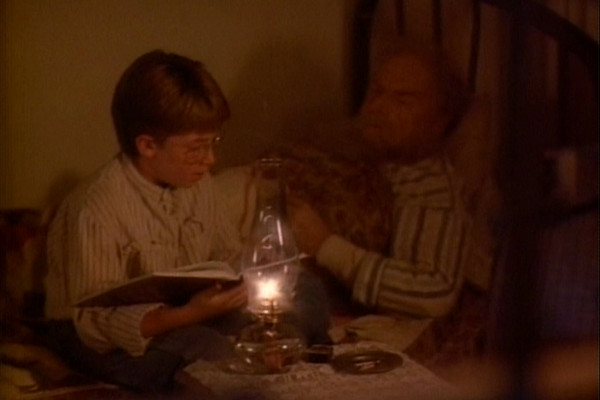
Quite a charming little tale about a young boy (David Faustino, seven months before he would appear on screen as Bud in Married... With Children) who keeps his ancient relative alive through the powers of stories. It's cute, but, like the majority of season two, generally quite mediocre.
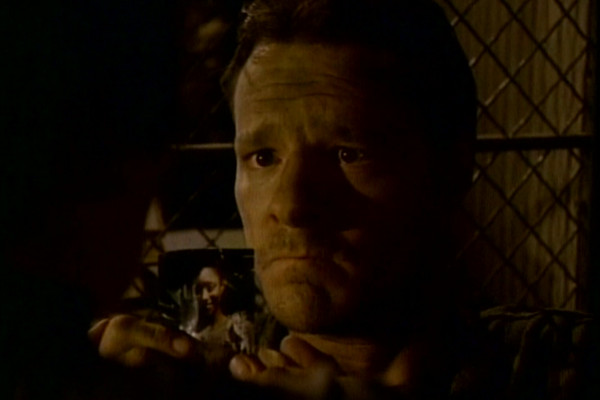
The second season had less than a handful of female writers in its roster; the third season had only one. The Junction is one of the few stories to be written by a woman, with Virginia Aldridge, who had also been an actress in the 50s and 60s. (Appearing in, amongst other things, the Star Trek episode Wolf in the Fold).
It's hard to get much detailed characterisation into just twenty minutes of screentime, but The Junction does it better than most, even if the notion of a black man who cheats on his semi-illiterate wife is something of an unfortunate stereotype, perhaps made at the casting stage rather than within the script itself. The 80s Twilight Zone was progressive for the time, and season one episodes like Dealer's Choice had black and white men spending social time together without any notice being drawn to it, or episodes like Wong's Lost and Found Emporium, which lead the story with two racial minorities. In this regard, the series can be forgiven for this one slight misstep. This said, having black actors never playing negative characters is also inverse racism, so it's somewhat to be commended. Overall, this is one of the better episodes in a run of mediocre season two entries... if perhaps a little "safe" in execution.
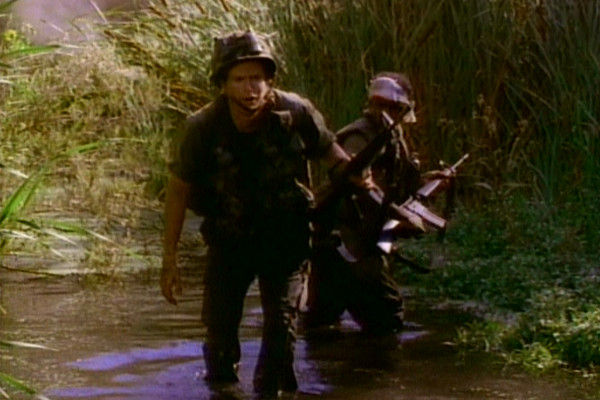
Wes Craven returns to the genre he's best at, directing a suspenseful horror about a man haunted by his avoidance of the Vietnam war. Star Cliff DeYoung can be a little hammy in his dual roles as the draft avoider and the version of himself who went to Vietnam, but it's one of the more involving stories of the season.
The DVD features eight deleted scenes, which are largely untrimmed existing scenes, but also contain material that was completely excised from the episode, such as the student who confronts DeYoung to ask if he'd fought in Vietnam... an event that's referenced in the existing material. There's also a commentary track by Wes Craven and Philip DeGuere, but, like all the commentaries on the season two DVD set, it's amiable yet inessential, giving interesting thoughts about the theme of the episode, but no real insight into how it was made.
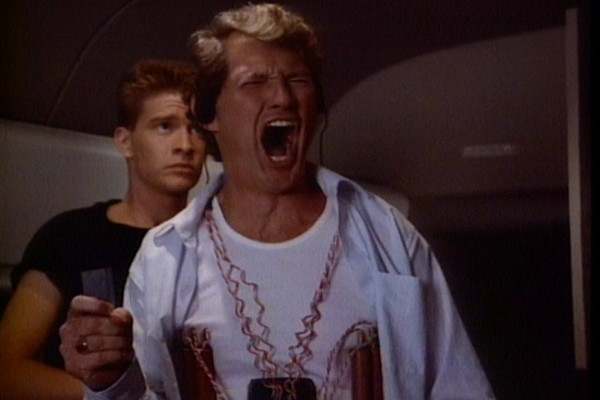
Season two of The Twilight Zone was far more bland and generic than the first, with far less range in storytelling. While this does mean that many of the wilder excesses were curbed, it does make it all feel very "samey". Apart from one or two instances, none of the season two episodes sink as low as season one often did... yet, apart from one or two instances, none of it reached as many highs, either.
Private Channel is one of just a handful of season two stories that were comedic in nature, an odd choice given that it's a story about a plane hijacking. The concept of being able to read other people's thoughts is not new to the Twilight Zone - as with the classic 1961 episode A Penny for Your Thoughts - but what makes this episode so engaging is the sheer over-the-top abandon of the performances from Scott Coffey and Andrew Robinson. Never giving any less than 110%, they provide the episode with a kind of misguided sparkle, and some of the misplaced verve that season one often had in spades.
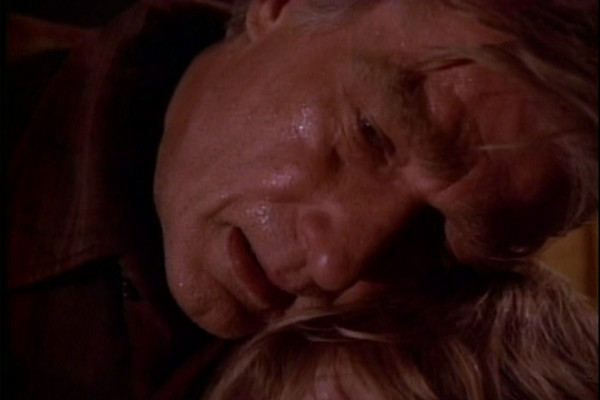
The first 80s story of The Twilight Zone to feature in an episode alone, The Toys of Caliban has a heavy weight against it whereby it must stand or fall entirely on its own merits. It was followed by episodes featuring only The Convict's Piano and The Road Less Travelled before the season returned to the more familiar format of multiple stories per episode.
Written by George R. R. Martin from a story by Terry Matz, the title - which receives no onscreen explanation - is a reference to Shakespeare. The story acts like a dark version of the original series episode It's A Good Life, whereby the child with the limitless powers isn't malevolent, but his innocence conjures up even more disturbing results. Particularly unnerving are a scene with a living heart and the corpse of his own mother.
Richard Mulligan returns to the series as the father of the child, showing unexpected dramatic range that proves he was often wasting his talents by appearing in lighter, broader roles such as Soap or Empty Nest. However, while the child in question is mentally retarded, the actor playing him is not, which does create something of an unsettling impression, particularly 30 years after it aired. What makes this just one of two season two stories that are genuine standouts is the bleak climax, though, like much of the 80s, it suffers from worn video stock and too many "browns" in the colour palette.
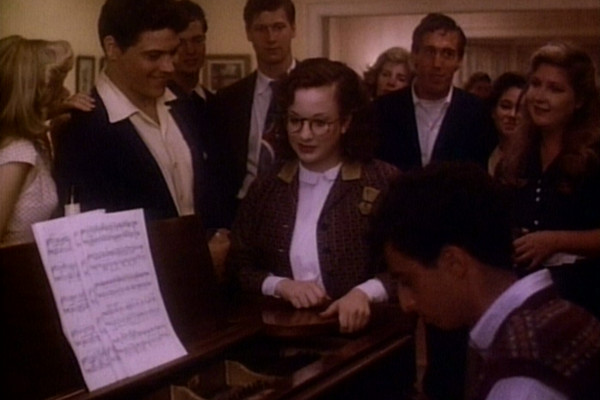
A quirky, off-beat and witty episode, where composer Binky Blaustein dies and is offered a wish by the Devil. He chooses to go back in time and make love to a girl who passed him by as a teen at a party. While there, he realises that it's inappropriate - a clear example of how different to the black and white episodes the 80s version was can be gleaned by the fact that this episode contains the phrase "child molester". (A later line "you think you're in love when you only have to go to the bathroom" was removed at the insistence of CBS). Interestingly, many of the comic lines were removed in editing, as the actor playing the Devil had troubling remembering his lines and the actor playing the older version of music composer Binky Blaustein tended to paraphrase.
Blaustein eventually discovers his real destiny is to stop a girl at the party committing suicide, in a story that's a vast league above any other in a fairly dirge-like second season. To give an example of how low the bar is for season two, then if lumped in with the previous ranking, Time and Teresa Golowitz may still have made the top five... the majority of the rest of the season wouldn't even have scraped into the top twenty-five.
The DVD release features two deleted scenes: one with the Devil removing Blaustein's body, and another where Teresa sits down with him at the piano, taking off her glasses to perform another showtune. Both scenes were removed when CBS decided to retool the series as a half hour (including adverts) production, but ultimately the story was placed with Voices in the Earth when they reversed the decision, resulting in a great deal of wasted time and expense. A commentary track is provided by Alan Brennert, who wrote the script based on a short story by Parke Godwin.